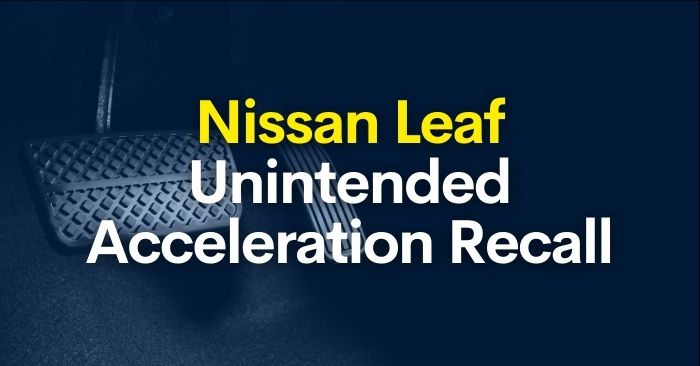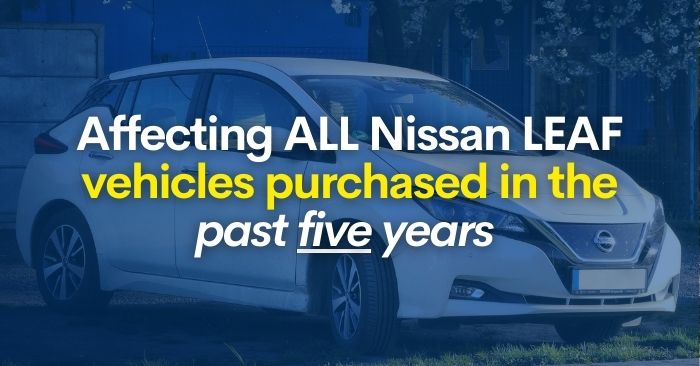Legally reviewed by: Jessica Anvar Stotz, JD, MBA
It’s possible that the National Highway Traffic Safety Administration (NHTSA) recalled your Nissan LEAF earlier this year if you bought it within the last five years.
More than 66,200 cars could experience unintended acceleration when gears are changed eight seconds after disengaging from cruise control, as per the NHTSA report. This manufacturing defect is linked to the vehicle control modules, which require reprogramming to address the Nissan Leaf unintended acceleration problem.
An issue arises when drivers switch driving modes (from “D” to “B”), activate the e-Pedal, or select “ECO” mode after disengaging the cruise control. In these scenarios, the vehicle may experience unintentional acceleration. Thankfully, Nissan says it has not received reports of warranty claims, accidents, or injuries pertaining to the defect.

Which vehicle years are included in the recall?
Every Nissan Leaf purchased within the last five years is included in this recall. According to the NHTSA, every vehicle within this category likely has the Nissan Leaf sudden acceleration defect. Fortunately, this problem is isolated to Nissan Leaf vehicles, and no other Nissan or Infiniti vehicles in the United States are included. Nissan Leaf owners received formal notifications about this recall starting from August 30, 2023.
What is the Nissan Leaf unintended acceleration issue?
The Nissan Leaf acceleration issue involves certain Nissan Leaf electric vehicles built between September 29, 2017, and March 15, 2023. The problem is attributed to a software issue in the vehicle’s control systems. When specific actions are taken immediately after turning off the cruise control, such as changing driving modes from “D” to “B,” enabling the e-Pedal “On,” or selecting “ECO” mode, the vehicle may continue to accelerate without driver input. In some cases, the car may not slow down as expected when the gas pedal is released, leading to a potential safety concern.
How will Nissan fix the acceleration problem?
Nissan dealerships will provide a recall repair service to reprogram the vehicle control module (VCM). This Nissan Leaf unintended acceleration fix comes at no cost to vehicle owners. This service is part of a voluntary safety recall campaign initiated by Nissan for certain model year 2018-2023 LEAF vehicles.
For inquiries or concerns about the recall notice, Nissan Leaf owners can reach out to Nissan’s customer service at 1-800-867-7669. Alternatively, they can contact the NHTSA Vehicle Safety Hotline at 1-888-327-4236 (TTY 1-800-424-9153) or visit www.nhtsa.gov.
The recall notice identifiers are as follows: NHTSA recall notice – 23V-494 and Nissan’s recall notice – R23A6. You can utilize the NHTSA website to perform recalls searches using your Vehicle Identification Number (VIN).

What should I do if my Nissan Leaf has acceleration or other issues?
If you encounter acceleration or other issues with your Nissan Leaf, be sure to take prompt action to ensure your safety and the proper functioning of your vehicle.
- Check for Recalls: First, check if your Nissan Leaf is subject to any recalls. Nissan has issued recalls for various models, including the Nissan Leaf, due to specific issues like unintended acceleration. Visit the Nissan website or the National Highway Traffic Safety Administration (NHTSA) website to verify if your vehicle is part of a recall. If it is, contact your nearest Nissan dealership to have the necessary repairs or updates performed, often at no cost to you.
- Contact Your Dealership: If your Leaf experiences acceleration or other problems not related to a recall, reach out to your local Nissan dealership. They have trained technicians who can diagnose and address the issue. Be sure to provide detailed information about the problem’s symptoms and when they occur.
- Document the Issue: Keep a record of the issue, including the date, time, and any unusual behavior. This documentation can be helpful when discussing the problem with the dealership or if you need to pursue legal action later on.
- Maintenance: Be consistent in following the manufacturer’s recommended maintenance schedule for your Nissan Leaf. Proper maintenance can prevent issues and helps ensure that your vehicle operates optimally.
- Safety First: If you experience sudden unintended acceleration while driving, prioritize safety. Apply the brakes, shift to neutral, and safely pull over to the side of the road.
Always consult with authorized Nissan dealerships for the most reliable solutions to any mechanical problems you encounter with your vehicle.
Contact the Lemon Law Experts for Assistance!
If you are facing issues with a Nissan or any other lemon vehicle in California, you can rely on the Lemon Law Experts to provide expert assistance. With our dedicated team of attorneys and multilingual staff, we are committed to serving clients throughout the state, offering unparalleled customer service.
Our experienced lawyers are not just professionals; they are service providers dedicated to helping you navigate the complexities of lemon law cases. We have a proven track record of success and have assisted numerous clients in resolving their lemon vehicle problems against large car manufacturers.
Whether you are dealing with persistent defects, safety concerns, or other issues with your vehicle, our team is here to help. Contact us today for a free, no-obligation consultation.




